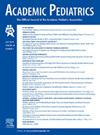Predicting Emotional Well-Being in Caregivers of Children With More Complex Special Health Care Needs
IF 3
3区 医学
Q1 PEDIATRICS
引用次数: 0
Abstract
Objective
Identify factors associated with reduced emotional well-being (EWB) among family caregivers of children with more complex special health care needs (SHCN).
Methods
We applied gradient-boosted trees (GBTs) to the 2016–21 National Survey of Children’s Health to identify factors associated with questions assessing 1) global mental health, 2) parental coping, and 3) parental aggravation among family caregivers of children with more complex SHCN. We then conducted adjusted logistic regression and post-hoc margins analyses to describe the relationships between GBT-identified factors and caregiver EWB outcomes.
Results
Our GBT models’ area under the curve scores ranged from 0.69 to 0.77. Among our sample, 1) caregiver reported lack of emotional support, 2) increased levels of frustration and effort in getting their child needed health services, and 3) the presence of child emotional and behavioral conditions were factors associated with reduced caregiver EWB. In margins analyses of adjusted regression models, GBT-identified factors were associated with significantly higher likelihoods of adverse caregiver EWB outcomes. For example, compared to caregivers who reported a source of emotional support, the predicted probabilities of experiencing poor/fair mental health (13.7% vs 7.8%), reduced parental coping (8.0% vs 2.1%), and frequently feeling bothered by (9.9% vs 5.4%) and angry with (3.5% vs 1.5%) their child were higher among caregivers who lacked emotional support.
Conclusions
In addition to enhanced care coordination support, future efforts aiming to improve well-being among family caregivers of children with more complex SHCN could consider targeting caregiver emotional support and/or treatment of child emotional and behavioral conditions.
预测有更复杂特殊医疗需求儿童的照顾者的情感健康状况。
目的确定与具有较复杂特殊健康护理需求(SHCN)的儿童的家庭照顾者的情绪幸福感(EWB)降低相关的因素:我们将梯度提升树(GBTs)应用于 2016-2021 年全国儿童健康调查,以确定与评估(1)全球心理健康、(2)父母应对能力和(3)父母加重病情等问题相关的因素。然后,我们进行了调整后的逻辑回归和事后差值分析,以描述 GBT 确定的因素与照顾者 EWB 结果之间的关系:我们的 GBT 模型的曲线下面积(AUC)在 0.69-0.77 之间。在我们的样本中,(1) 照料者报告称缺乏情感支持;(2) 在获取孩子所需的医疗服务时遇到更多挫折,付出更多努力;(3) 存在儿童情绪和行为问题,这些都是与照料者 EWB 下降相关的因素。在调整回归模型的边际分析中,GBT 确定的因素与照顾者 EWB 不利结果的可能性显著增加有关。例如,与报告有情感支持来源的照护者相比,缺乏情感支持的照护者出现心理健康状况不佳/一般(13.7% vs. 7.8%)、父母应对能力下降(8.0% vs. 2.1%)、经常被孩子困扰(9.9% vs. 5.4%)和对孩子生气(3.5% vs. 1.5%)的预测概率更高:除了加强护理协调支持外,未来旨在改善患有更复杂 SHCN 儿童的家庭照顾者福祉的工作可以考虑针对照顾者的情感支持和/或儿童情感和行为状况的治疗。
本文章由计算机程序翻译,如有差异,请以英文原文为准。
求助全文
约1分钟内获得全文
求助全文
来源期刊

Academic Pediatrics
PEDIATRICS-
CiteScore
4.60
自引率
12.90%
发文量
300
审稿时长
60 days
期刊介绍:
Academic Pediatrics, the official journal of the Academic Pediatric Association, is a peer-reviewed publication whose purpose is to strengthen the research and educational base of academic general pediatrics. The journal provides leadership in pediatric education, research, patient care and advocacy. Content areas include pediatric education, emergency medicine, injury, abuse, behavioral pediatrics, holistic medicine, child health services and health policy,and the environment. The journal provides an active forum for the presentation of pediatric educational research in diverse settings, involving medical students, residents, fellows, and practicing professionals. The journal also emphasizes important research relating to the quality of child health care, health care policy, and the organization of child health services. It also includes systematic reviews of primary care interventions and important methodologic papers to aid research in child health and education.
 求助内容:
求助内容: 应助结果提醒方式:
应助结果提醒方式:


